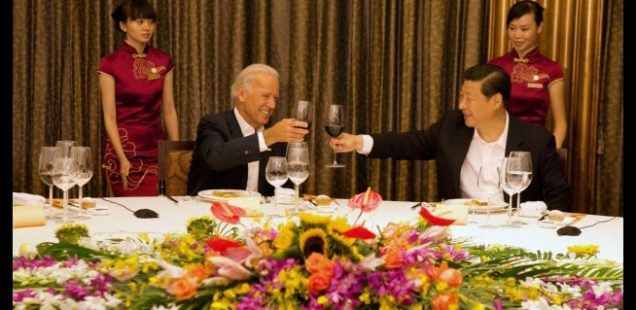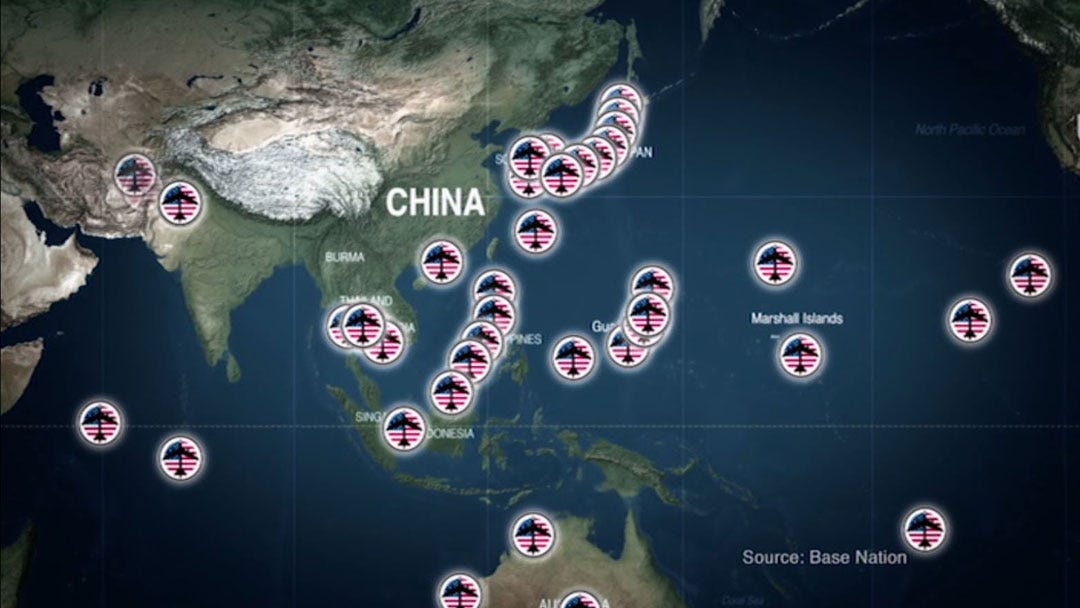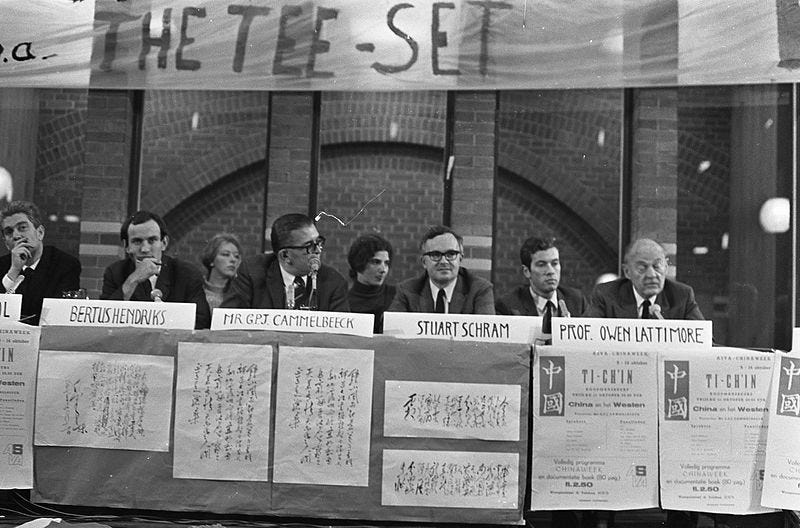
“Our China ‘diplomacy.'”
Incompetents in command.
This is the second of a three-part series on China and the West’s obsession with its emergence as a regional and global power. Part 1 can be read here.
Not one week after President Biden announced a tripartite security agreement with Australia and Britain, a daringly provocative and escalatory military partnership aimed squarely and solely at China, the man from Scranton had this to say at the 14 September opening of the U.N.’s annual General Assembly:
We’ve ended 20 years of conflict in Afghanistan. And as we close this period of relentless war, we’re opening a new era of relentless diplomacy….
… We’re not seeking—I’ll say it again—we are not seeking a new Cold War or a world divided into rigid blocs.
I stand here today, for the first time in 20 years, with the United States not at war. We’ve turned the page.
It takes a lot of nerve to be President Joseph R. Biden, Jr., one has to say.
Ever more consistently, what Biden has to say to the world turns out to be at wide variance with perfectly discernible realities. In my take on the matter, this is a man who spent half a century swindling and suckering his constituents as he rolled logs day in, day out in the Senate, and now he appears to think the same sort of shtick will be good enough in a global context. He is already proving mistaken, if you have not noticed. The Biden foreign policy, such as it has been to date, has not gone over well.
Least of all with China.
We are at war, in multiple theaters—in Syria, in Somalia, in Iraq, in Yemen. The Pentagon has special operations in motion in several score nations as we speak. There are covert wars of subversion waged against Cuba and Venezuela. On 21 September, the House Foreign Affairs Committee outlined in breathtaking detail America’s plans for an extensive escalation of its attacks on Nicaragua’s government, economy, and people. As to Cold War II, institutional Washington is reorganizing its agencies and departments to wage it against the People’s Republic with unmistakable urgency. How hollow Biden’s U.N. speech must have rung to the assembled world leaders.
Secretary Blinken is worse in this connection, regrettably. I confess I have come to find it offensive to watch him prattling daily about press freedom and human rights and starving children and self-determination and—his fav—“the rules-based international order,” while this administration shows no respect for press freedom when it is inconvenient to neoliberal authoritarians, or human rights, or the nutrition of children (see Syria, Venezuela, Cuba), or others’ rights to determine their futures (see the aforementioned and add Nicaragua, among others). The rules-based order cannot be taken any longer as anything more than a flimsy euphemism, as worn as an old shoe, for the profound disorder arising from America’s insistence on maintaining its hegemony in a multi-everything world.
I find this kind of thing frightening. It is more now than merely a display of ineptitude. The many matters at issue are simply too grave, too fraught with very real and near dangers, for these sorts of departures from the world as we have it to lead anywhere other than to great disorder and great suffering on the way to great failure.
Let us consider Biden’s promise of relentless, dedicated diplomacy, especially as it pertains to China and the rest of Asia. It does not mean, I will say straightaway, diplomacy by any worthy definition of this term. “Diplomacy” is how we will have to think of it.
To be noted, Biden’s remarks at the U.N. Tuesday were an echo of a theme that he and his people sounded regularly during the 2020 campaign season. Now as then, this emphasis on diplomacy as against war and subterfuge is repeatedly advanced because it is evident this is the direction Americans and the rest of the world want the U.S. leadership to take. But it has little to do with how this administration intends to conduct its and our affairs abroad—and least of all across the Pacific.
How, then, is this going to play out? It is vitally important to consider this given the Biden administration has made countering China the alpha and omega of its global strategy. The new U.S.–Britain–Australia defense deal—make that “defense” deal—adds considerable urgency to the question.
What, in short, do Biden and his people mean by diplomacy? I am sure they wonder the same thing in Paris, Berlin, Tokyo, Delhi, Seoul, Rome, and elsewhere. I will leave London and Canberra off this list: They know well what the administration means. Beijing and Moscow need not be included, either: They know, too.
After long months of confusion, misfires, apparent indirection, and messes in its trans–Pacific relations, the Biden administration at last has a China policy and a policy toward East Asia altogether. It is clear. There is intent and determination in it. But it is not coherent. In broad outline, Biden’s foreign policy people propose to threaten China with increasing displays of military might while expecting its cooperation on matters such as climate change and global health.
Sheer muddle. It is wrong in this and its other aspects such that one can scarcely believe those who have fashioned it think we should take them as serious people with a practiced knowledge of diplomacy and accepted norms governing relations among nations. They are not and we should not.

It was evident even during President Biden’s political campaign last year that his administration’s trans–Pacific efforts would be fundamentally defined by its desire to contain China. “Contain” is a dated term but for just this reason it is right: This project is so hopelessly 20th–century it fairly creaks. Here’s the paradox: The American policy cliques cast China as a threat and propose to contain it because they require it to be threatening even if it does not pose one and because they know China cannot be contained in the meaning this term has in statecraft.
At the same time—another paradox here—it was also clear even before Biden was elected that his administration would assume office with no idea how to shape its obscured intentions into a presentable policy. It had to cultivate a confrontational relationship with Beijing while pretending not to want confrontation. So far this project has gone badly. And so it will continue to do, I will add.
Secretary Blinken spent the administration’s first senior-level encounter with Chinese counterparts reciting his worn-thin platitudes in Anchorage last March, and to the surprise of many the Chinese responded in kind. As I suggested at the time, the Chinese response signaled a significant turn in Beijing’s posture toward America and so in the complexion of the relationship.
Then we had Wendy Sherman trying on the same thing in Tianjin in July. Vice–Foreign Minister Xie Feng had plain words for Blinken’s over-promoted deputy, urging the Biden administration to “change its highly misguided mindset and dangerous policy.” It takes a lot to push Asians beyond their customary and admirable courtesies in their dealings with others. By the time Sherman got on her plane back to Washington, it was clear the people running America’s trans–Pacific policy—who do not seem to include the president, actually—had done so.
A few things have happened since Blinken’s disaster in Alaska and Sherman’s talks in an industrial city on China’s northeast coast—curious she was not invited to Beijing. And in these developments we read this administration’s Asia policy in full and distinct outline, provocative animosity toward China its centerpiece. What we see now is what we’re in for over the next three and some years. I’m not sure who is the worse off for it, the Chinese or us, we Americans—or the rest of humanity, for that matter.
20 August was a very big day for the Biden administration’s Asia policy in the making. The president announced simultaneous appointments to two of the most important diplomatic posts in the western Pacific. Pending Senate confirmation, Rahm Emmanuel is to serve as ambassador to Tokyo, and Nicolas Burns will take up the ambassadorship in Beijing.
A week later Biden (or whoever is making these decisions) sent Vice–President Harris on state visits to Singapore and the Republic of Vietnam. Harris, whose heartbeat-away proximity to the Oval Office never fails to trouble me whenever I think about it (and I try not to), was working the opposite end of the same garden Blinken and Sherman befouled shortly earlier, seeking to recruit two key Southeast Asian nations in the anti–Chinese crusade. No sale in either case.
Emmanuel, Burns, Harris. These two appointments and an official tour in East Asia got passing mention in the press at the time and have had no consideration since. They deserve our scrutiny (which goes a good way to explaining why the press gave it none). What are we to make of this crew? What is being done here? What are we witnessing? We can ask these questions all by ourselves.
Rahm Emmanuel is a longtime Democratic Party operative—chair of the Democratic Congressional Campaign Committee, chair of the Democratic Caucus, confidant of Hillary Clinton, Obama’s first chief of staff—with a reputation for ignoring the perspectives of others and getting messy work done however messily it had to be. Supporter of the Iraq invasion, all-around exceptionalist, my imperium right or wrong (assuming for a moment Emmanuel knows the difference).
R. Nicolas Burns is a lifelong climber of ladders, serving in the Foreign Service under four presidents—Reagan, Bush I, Clinton, Bush II—and afterward surviving in the floating world of think tanks and lobbyists. There is a touch of the old Young Americans for Freedom about our Nicolas, I find. He is another supporter of America’s wars, not least Iraq. Notably, he was Bush I’s director of Soviet and subsequently Russian affairs at just that moment America started fantasizing that Russians could be made to be “just like us.” A crusader, then.
As to Kamala Harris, I will quote the memorable Ron Nessen (always fun in these sorts of circumstances): I have no further comment at this particular point in time. Our Kamala speaks for herself, I would say. I greatly, greatly hope that Singapore-to–Hanoi escapade does not indicate that Harris will carry the White House’s East Asia portfolio. Even Biden (or whoever) couldn’t be that dim.
What do we have here? Or best to start with what we don’t have.
None of these three has any shred of experience in or knowledge of East Asia—none, no hint of it on any of their c.v.’s. Emmanuel knows nothing about Japan, Burns nothing about China, and Harris knows nothing about anything so far as one can make out.
Owen Lattimore is spinning. John Service is spinning. Hugh Borton and E.H. Norman are spinning, too. And the great Joe Levenson. And the late and great Chalmers Johnson. Lots of people are spinning—anyone who would remember when diplomacy rested on a thorough grasp of the histories, cultures, and traditions of others and an interest in their way of seeing the world and events in it.

The above mentioned were either diplomats or scholars involved in the progress of diplomacy. They all shared an authentic interest in Asia and its peoples. All of them were active during the early postwar years. When they addressed Asians they spoke to them—and always respectfully of them. Some of them suffered for their integrity during the Cold War decades, some of them greatly.
It brings one close to weeping—no laughing here—to put Emmanuel, Burns, Harris, Blinken, and Sherman next to these people. Departing from decorum as the point warrants it, these people don’t give a shit about Asia. They do not and will not talk to Asians: They will talk at them, as Blinken, Sherman, and Harris have already demonstrated. When they speak of Asians, it is in the key of empire.
The State Department is now in the process of organizing a “China House” within its ranks, Foreign Policy tells us—a greatly enlarged China desk of some kind. Do not be mistaken: The intent here is not to improve Washington’s understanding of China; it is to “monitor” and record China’s every move everywhere in the world, the better to cultivate the confrontation Washington earnestly desires. Now you know what I mean by spinning.
The task ahead is not to listen to the Chinese or anyone else in East Asia when they have things to say. It is to project, outward from the imperial seat, not to take in or still less to recognize others as they are. Nicolas Burns, take my word for it, will never explain back to Washington anything about China’s legitimate interests because China’s legitimate interests are absolutely never to be spoken of. In all likelihood, he will never concern himself with them.
Long ago a first secretary at the American embassy in Tokyo said to me at a cocktail do, “It used to be diplomats were sent abroad to lie to other countries. Now we’re sent abroad to lie back to our own country.”
It’ll be both as the Biden administration fields its people across the Pacific. They will misrepresent Washington’s intentions—“We are not seeking a new Cold War”—and they will lie up, down, and sideways as to what the Chinese and other East Asians think and want.
This is what the Biden administration means by relentless diplomacy. It’ll be relentless all right, but it won’t be diplomacy.
A short while after Harris’s failed effort to recruit East Asians to the anti–Chinese cause, Biden telephoned Xi Jinping to propose a summit. Now you know why the Chinese leader declined, or at least the context of his “No.” The score was clear by then. It may be Xi saw the submarine deal coming by the time of that telephone call, too.
And now we can understand the tripartite security agreement that the core of the Anglosphere just struck. It looks to me as if the Americans may have given up getting East Asians (including the Japanese) to back the Sinophobic crusade anything more than lukewarmly, just as they appear to have given up on the Continent. Leadership—with a paucity of followers—will fall to three English-speaking nations with all the binary East–West paranoia the endeavor will need to hold together.
I see alienation developing between Washington and its traditional allies across the Pacific, subtly manifest as this may be. And Cold War II is open-and-shut destined to fail: It remains only how messily this failure will come.
Empires, if you go back in history, are toward their end deaf and blind. Failing to see others as they are or hear them as they speak are the first signs of terminal decline. There does not seem to be any going back from this stage. In this connection, maybe Joe Biden is just the right president for the United States at this sad point in its long, pretty much sad story—the world’s objective corelative.

